Podcast: Download (Duration: 42:40 — 39.3MB)
Get Notified Of Future Episodes Apple Podcasts | Spotify | Amazon Music | Android | Blubrry | Gaana | TuneIn | Deezer | Anghami | RSS | More
In the podcast:
02:27 – Why have a show in the first place?
05:56 – Traditional TV versus the Internet
12:07 – How easy is it these days?
14:10 – An audience for everybody
17:19 – Hope for introverts
28:46 – Tactics you can use
30:58 – Some of the catches
35:12 – Other stuff from Andrew
39:07 – A piece of parting advice
Want your own show? Check out Andrew’s course
Take the trip of a lifetime to the Maldives with James. Details HERE
Transcription:
James: James Schramko here. Welcome back to SuperFastBusiness.com. And today we are talking about how to create a profitable video podcast show, so to speak. And I’ve brought back serial entertainer Andrew Lock to talk about this. Good day, mate.
Andrew: Wow. I’ve never been called that before. Serial entrepreneur, yes. What a privilege it is to be on SuperFastBusiness as you dominate the world.
James: Well, we’ll have to find a picture of you with an unusual attire or something from the recent event.
Andrew: Well, that shouldn’t be too hard.
James: You’ve been known to entertain. And I invited you over to SuperFastBusiness Live again this year of the back of the year before, where you were voted most popular speaker for your discussion around memberships.
Andrew: Yeah, that was fun.
James: You know, you seemed to be aligned with a lot of the same topics that I’m talking about on this show. We’re always talking about memberships and subscriptions and this obviously being a podcast, I’m a huge fan of publishing content and bringing in an audience and finding people who are a good fit to help in moving them through to other solutions.
Andrew: I was just going to say, we both do those things because they work.
James: They do work. And it’s always good to just cross collateralize some ideas.
Why have an online show?
I remember when I bumped into you in the loft apartment many, many years ago. You had a top video on the iTunes platform, I think it was the number one business show. And you’ve obviously made huge headway in the video side of things, and I’ve primarily stuck to my audio format. And it’s really good to just talk about some of those subtle differences. Why is this important at all? I suppose we should start with the simple stuff. Why would we even think about having a video or audio show of any kind?
“Online videos are shared over a thousand percent more than articles. “
Andrew: Well, ultimately it’s about getting people’s attention. You know, especially the younger generation these days, they’re just not reading as much as they used to. In fact I came across some interesting stats recently that well, for one thing, millennials spend more time watching videos on their mobiles than they watch traditional TV. Like, way more! Online videos are shared over a thousand percent more than articles. I think the actual figure is 1200 percent more. And it’s just really getting in front of people in a way that is very easy for them to consume our content. And so yeah, that’s what it’s all about, it’s reaching people in the way that is very palatable to them.
James: Yeah, I guess there’s some evidence that the traditional publishing networks are just not working as well as they used to. I suppose in the old days, we’d read the newspaper and we’d watch the free to air TV news. And maybe that’s just not how people are consuming anymore.
Andrew: No. I mean, there’s a huge shift happening. There’s a number of reasons for that over the last, I would say it started about 10 years ago, but it was very, very slow to begin with. But the last three years or so has been a massive acceleration. One of the reasons for it was when it became easy for people to create, upload and share content, because that used to be very expensive to do and the quality wasn’t very good. We all remember sort of suffering through jerky videos that kept stopping and starting and it’s just frustrating.
That’s one thing, and then the other thing is that the big name content producers, like the traditional TV networks and so on, they’ve realized that the internet represents an amazing way to expand their reach, because they’re not limited by geography. And they’re also not limited by the very high cost of making traditional TV shows.
So it’s like there’s a perfect storm happened where, well one other thing too that has sort of contributed to it is the fact that certainly in the States, every new TV now from the major manufacturers is internet-connected and it will either have apps or it will have software like a Roku. But in essence what they’ve done is they’ve brought in content from the internet.
So side by side, people can make a choice now. They can say, “Do I want to watch traditional TV or do I want to watch a niche topic show that’s distributed through the Internet?” And so this is the biggest game changer in history because now anybody, anywhere in the world, with access to an internet connection can create a show and have it viewed by unlimited number of people worldwide. So it’s very, very exciting.
A change in consumption
James: I’m wondering too. I wonder how consumption has changed if we’re not just watching on TV anymore but it would seem that we’re happy to watch things on our laptop or our desktop or iPad or tablet device or our phone. Most people watch a lot of content away from the TV environment altogether.
Andrew: Absolutely. There’s no question about that. Like the stat that I mentioned earlier, the millennials which is 14 to 25-year-olds, they are absolutely ditching TV to watch content on their mobiles. But if you think about even the average business traveler, rather than sitting down in front of the TV in their hotel room, they’re tending to either watch content on their iPad or on their phone or other tablet or on their laptop. And one of the reasons for that is because they have a better choice. They can access these shows on demand, and they can also access niche topic shows, which is one of the big opportunities for us because as a business owner, that opportunity didn’t exist before.
And so when people when people have a choice of watching traditional regular TV shows that are broader topics or these niche topic shows. The evidence is showing that people are seeking out niche shows that more closely match their interests. So it’s a huge game changer and it’s still evolving as we speak. But yeah, people are leaving traditional TV in their droves.
James: I can really relate to this, because I can’t remember the last time I turned on a TV in a hotel room. And also the newest car that I got has the iTunes logo in the dashboard, like they’re really integrating this. But one thing that’s sort of come into my mind: is it really only Netflix who’s cutting the lunch of the big networks, or are we actually talking to someone who might be listening to this podcast?
Andrew: How do you mean? Do you mean there’s other players on?
James: Like, how big a player do you have to be to get the audience’s attention? Like I mean, I’m just wondering…
Andrew: I see what you mean.
James: Yeah. If someone is listening to this, are they thinking, ‘Well, he’s not talking about me, he’s talking about Netflix or Showtime or whatever.’
Andrew: Yeah that’s a great point.
James: Great point asked poorly.
Andrew: No, no, I get it now. So the good thing is that Netflix has done an enormous service to everybody in this space, because they are the kingpin, as it were. But on the heels of Netflix are other big players like Amazon and Roku and there’s plenty more smaller ones as well. But it really is the expression of a rising tide raises all ships. And so if you think about the TVs that are network-connected, the apps that are on these TVs enable anyone to be side by side the content of Netflix.
To give you a specific example, the Roku box, which I’m not sure if you’re familiar with it, but Roku was originally what Netflix was designed to be as the next generation after DVD. It was actually owned by Netflix. And what happened was they had created this box that could stream content. And at the last minute, they decided to change their plan. And rather than distribute a box, they wanted to create a software that could be integrated in other people’s hardware. So software that could be integrated in a Sony PlayStation for example or DVD players and so on.
And so what happened was the team behind Roku broke away from Netflix and they created their own company called Roku. But Roku is now the largest of the hardware boxes. And the point really that I wanted to make is that if you have a Roku device, there’s apps, and so you see these little squares on the screen, just like Apple TV as well.
Well, on one of those squares, you might have Netflix or Hulu which is the big TV distribution for these boxes in the States. But the next app next to that could be you. And in many cases it is.
This is where it has been a game changer because literally side-by-side, if someone discovers you and it’s easy for them to discover this type of content now, they can elect to say, “Yeah, I want Netflix, I want Hulu, I want, Help My Business, which is one of my shows, or they want SuperFasBusiness. That is a very real world situation right now. So this is why it’s so exciting.
James: It is. It’s actually super true what you say. I know on my Apple TV you can pull up iTunes…
Andrew: All your episodes. Yeah.
James: Yeah. I can pull up my own show. In my car, I can click on the podcast and I can listen to a Tim Ferriss. He’s just some guy sitting in San Francisco with a microphone and a glass of wine chatting to someone. And I’ve also got this other device called a Kodi. Maybe that’s similar to a Roku.
Andrew: How do you spell it?
James: K-O-D-I. It seems to find all sorts of things.
Andrew: Yeah, exactly.
James: Add-ons and stuff.
So what we’ve established here is that it’s good to have a show, because you can create content that gets the attention of your perfect audience, that the media channels have become much more accessible and you don’t have to go and advertise on commercial television anymore or pay for advertisements. You could just, if you want to publish you just start publishing. And big companies like Netflix have paved the way for all of us where people are used to just streaming content right there on their device.
When it was hard to get online
Now I know you got into this pretty early. I bet it wasn’t always this easy to get online. It was probably harder when you started out.
Andrew: Oh, absolutely! When I started, most of what we just talked about didn’t exist. That’s been relatively recent developments. But the thing that really gave me a big sort of jump in terms of, you know, because I was one of the first video podcasts in the business space and that was iTunes. Apple offers the iTunes software to both Mac and PC users.
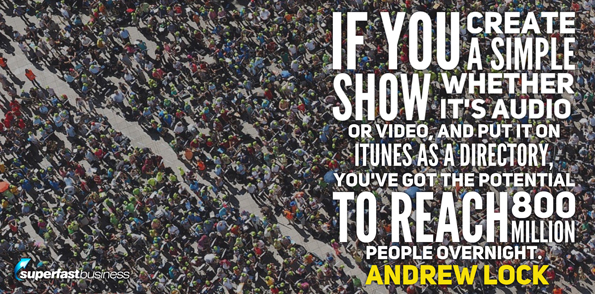 And because of Apple being Apple, there’s over eight hundred million users of iTunes. Well, every single one of those has access to the podcast directory which is in iTunes. And so one of the hard things that a lot of people struggle with online is getting traffic. Well, if you create a simple show, whether it’s audio or video and put it on iTunes as a directory, you’ve got the potential to reach 800 million people overnight.
And because of Apple being Apple, there’s over eight hundred million users of iTunes. Well, every single one of those has access to the podcast directory which is in iTunes. And so one of the hard things that a lot of people struggle with online is getting traffic. Well, if you create a simple show, whether it’s audio or video and put it on iTunes as a directory, you’ve got the potential to reach 800 million people overnight.
I just actually did it myself with a new show. The time that we’re recording this just a, couple of days ago. And I literally did it overnight. I mean sometimes it takes them a week to approve it, but for this new show, they literally approved it within a few hours. And I was I was available in front of those 800 million iTunes users and of course, there’s always some strategies to stand out from the crowd and make sure that you get noticed and so on. But all of those things are very possible once you delve into it like I have.
That was really the genesis for me, was leveraging iTunes. And that still applies today. I mean you’re on iTunes. And it’s an amazing way to attract the right audience that are interested in your particular topic, whatever that topic might be. I mean there’s literally shows on every topic you could possibly imagine in iTunes, which shows that there is an audience for everybody.
Something for everyone
James: Give me some examples of some of those. I think you mentioned some of these at the event that were astounding. I’m sure the obvious ones, like it’s easy to figure out why there might be an audience for a business podcast like this one.
And I totally agree with you. The leverage of it is just phenomenal. It actually still blows my mind that we could have a conversation today, record it, and upload it to a little electron sitting somewhere on an Amazon server and someone can be on their phone in the future and click on a little button and listen to it. And they could re-listen to it, they could share it with all their friends, they could go and leave a great comment if they like. But the fact that it’s work you do once that can be leveraged over and over again, that every episode is going to be listened to thousands of times over the next few years, that is just mind-boggling.
So give me a couple of whacky topics and then I want to ask you something about the barriers to entry.
Andrew: Sure, yeah. I mean, every type of health aspect that you could possibly think of is covered in a podcast. I’m really into travel, so I listen to a lot of travel podcasts that are very niche-specific. I listen to one about travel credit cards that give you more points. This is a whole show about that topic. There’s topics about every aspect of money – investing, lending. Languages, learning different languages, teaching different languages. There’s podcasts about religion, science, sports, technology, games and hobbies. A lot of these topics, I don’t even understand what they are. But there’s podcasts on knitting, there’s podcasts on all these kind of Japanese fads of toys and games. I mean it just goes on and on and on and it’s incredible!
James: There was a show for people who had inflatable jumping castles?
Andrew: There may well be. I think I was referencing a membership site when I talked about that.
James: Yeah, there’s just some crazy stuff. I actually know someone has a podcast about clotheslines.
Andrew: Oh really?
James: Yeah. Like, wow! And I’ve got clients in crazy industries like the funeral industry, stuff you wouldn’t normally think about. But it really does affect all of us.
Andrew: Absolutely. I’m looking at iTunes right now, I just see one called Tasmania Talks – your voice on the issues of Tasmania.
James: Great. Tasmania’s, just for our global audience, that’s just a little island off the south coast of Australia.
Andrew: So there you go.
Should shyness be an obstacle?
James: Barriers to entry. Look, you’re a confident chappy, Andrew, you don’t mind socializing and I’m probably a little bit less outgoing than you. Maybe I was shy, but I remember sitting at home thinking about how well people like Anthony Robbins and Jay Abraham and Yanik Silver and Marlon Sanders and Brad Sugars and all of these nightingale-type programs, Tom Hopkins, Brian Tracy – and I thought, well, they’ve all got audio cassettes or MP3s. Clearly if I’m going to get into this business space, I’m going to have to record myself on audio. And that terrified me!
Andrew: Yeah.
James: It seemed like a huge obstacle. I hate the sound of my own voice. I didn’t even know what I would talk about. And there’s really nothing exciting about sitting there in a room with a recorder preparing to record something for the first time. It can be a little bit daunting. Have you got any suggestions on it? Is it only for some people, or can anyone do it?
Andrew: Well, first of all, it’s a really good question, because I think you might be surprised by what I’m about to share.
“This is a time to not bury your head in the sand.”
The first thing though to mention is that, because this is the wave of the future, this is not going away. This is just becoming increasingly important. This is a time to not bury your head in the sand and think, well, that’s for other people who are extroverts or whatever. This is a time to say, “You know what? I absolutely need to take this seriously,” because it’s such an amazing opportunity and there’s sort of a gold rush period happening where people are putting a stake in the ground to secure their space, you know, a bit like the early days of the domain names. So that’s why everybody listening to this should take it seriously.
What I was going to share as far as shyness and so on – I absolutely never resonated with doing this. I was always behind the scenes. My original background was a cameraman. And the thought of being out front absolutely filled me with fear and dread, and I am an introvert. But I saw what was happening in this space and I knew that I had the technical capabilities of doing it when it was new, because it was a lot harder back then than it is now. And I thought, well, I am passionate about the topic. And so hopefully people can overlook my lack of presenting skills and realize that the message that I have is a good one and that it’s going to help them. And as a result I just did it, and went out in front of the camera.
And when I look back at those first episodes, I think they’re awful. They’re terrible. But they did serve a purpose back then and they did build an audience even though they were awful, because I think people sort of resonated with someone who is real, rather than a slick presenter, which does not work in this context. And over the years I just kept on doing it and I got better. So that’s one option.
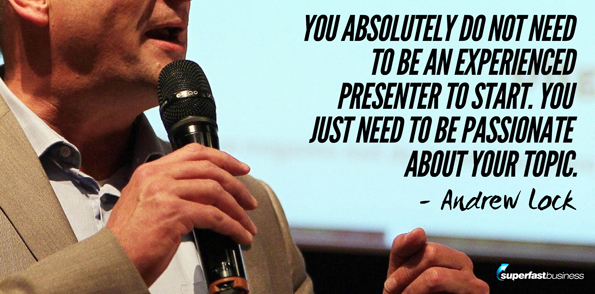 You can definitely learn from me in that respect that you absolutely do not need to be an experienced presenter to start. You just need to be passionate about your topic. That’s number one most important. But the other option is you can either get someone else, like if you have a business, well, choose someone else to be the front person. And another option as well is to get like a panel discussion. You could have interaction between two of you or more. All of those options work well for a show.
You can definitely learn from me in that respect that you absolutely do not need to be an experienced presenter to start. You just need to be passionate about your topic. That’s number one most important. But the other option is you can either get someone else, like if you have a business, well, choose someone else to be the front person. And another option as well is to get like a panel discussion. You could have interaction between two of you or more. All of those options work well for a show.
So it doesn’t have to be you. You can bounce ideas off of other people and you can present with someone else so that you don’t have to worry so much, and you can sort of have a nice chat like we’re doing now or do it as a panel. So yeah, there’s options out there. But the main thing is, just don’t ignore it, because you’re concerned about a fear of worrying about how you’re going to sound, because that’s not a good reason to not do it.
James: Yeah, I think you make a good point that just doing it is a good part of that path. I know a lot of my early episodes – hey look, we’re in the 500s now. Like, the last time you were on I think we were up to 518, and my podcasts are still pretty ordinary. But that’s OK. I think people really resonate with real.
Andrew: I don’t think it’s ordinary. I think that the content is excellent. I mean, I listen to the show because I know I’m always going to get great ideas from people that know their stuff. And it is absolutely the case that people don’t want slick.
James: That is great. I saw a great example of that. A friend of mine has a huge following on YouTube with his own videos. He’s got hundreds of thousands of subscribers and he made a specific change to actually detune the level of tech that they were using for the production and make it more streets-y and behind the scenes-y and it actually had a lot more impact. So people, I think, are somewhat skeptical if it’s overly polished, which is very reassuring for someone sitting at home.
Look, I’m sitting at home here in my T-shirt, at Manly, recording on a microphone that you can buy in any audio store and plug into your computer. And the fact that we can do that, it’s just mind-boggling, really. We can be in production that people will forgive an element of polish if the content’s good and just getting started is a huge secret to momentum. And there’s one little thing that I sometimes tell people for the video stuff, is that people only see the stuff you choose to publish. It’s not like you have to livestream.
Andrew: That’s it. That’s it. Yeah. These days, you know, used to be that you had to use tape. And tape was expensive and when I first started doing video production, it was a real hassle and we were worrying about running out of tape and so on. But with digital, we don’t have any of those issues.
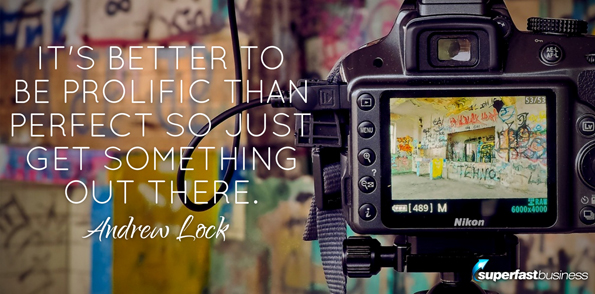 And you’re absolutely right. What people should be doing is just starting and good enough is good enough. It’s better to be prolific than perfect so just get something out there. And I guarantee that you will find an audience that resonates with you and your style.
And you’re absolutely right. What people should be doing is just starting and good enough is good enough. It’s better to be prolific than perfect so just get something out there. And I guarantee that you will find an audience that resonates with you and your style.
In fact, I just had a consult earlier today with a guy who was very nervous about starting a show. He’d taken my course and he’d gone through it and he said, “You know, I’m not an extrovert like you,” and well, I said, “First of all, I’m not an extrovert. I’m a situational extrovert in that I bring energy to when I’m presenting , but other than that I’m happy to not be with people and so on.” So one of the things he was worried about was just not having the sort of charismatic presentation style that he sees other people have. And I said, “Look, if you are kind of a really quiet person who doesn’t go out much and so on, and you talk about that in your show, then you’re absolutely going to find those people.” They’re going to find those people that resonate. And those listeners or viewers are going to think to themselves, ‘Oh, it’s so great that there are other people like me, because I listen to all these livewire people.’ Like, maybe they’re turned off by someone like Gary Vaynerchuk or someone that’s so extreme to them.
James: Well, those guys can intimidate you. They can make you think, ‘Oh, I could never be like that.’
“Everybody has their audience.”
Andrew: Yeah, exactly. But that’s not the point. The point is that everybody has their audience. There’s people to resonate with everybody. So it doesn’t matter who you are, even if you’re a hermit you’re going to attract other hermits. That’s the great thing about this type of show.
“It’s really important to be true to yourself.”
It’s not about copying what you see other people doing. It’s really important to be true to yourself. And that’s one of the big, big things that I hammer home in my training, because the tendency is to copy others. The tendency is to think, ‘Well I really like this show, and so I’m going to create a show that’s in that style. But what people should be doing is really thinking about well, ‘What do I bring to the table? What’s unique about me? That’s the things that will make a show really interesting and different and unique.
James: What’s that thing where people all meet together and like a random crowd? Is it swarming or something?
Andrew: Yeah, I know what you mean…
James: Yeah, I wonder if introverts do that? That’d be hilarious, like with three people show up to one another’s…
Andrew: That’s funny.
A disclosure by James
James: Look, I also think it’s fair to disclose at this point that some time ago I went to acting school. My mom thought I was just too under-confident.
Andrew: Oh, really?
James: James: I was, all through school I was under-confident…
Andrew: Interesting.
James: …and always getting bullied by the confident rich kids. And she said, “Look, I’ll go halves with you – every dollar you put in, I’ll put in a dollar and you go to acting school.” And I did it for four years.
And the very first night I went, it was like the first and last week of this 10-week term or whatever it was, something like that. They would do these exercises, like you’d have to stand in the middle of the group and do these things. And I thought, ‘Oh my god, this is like a candid camera. There’s no way this is legit.’
I had such barriers and fears around it. And over the years, watching myself back on tape and performing in different roles and getting some tips on putting more variety into my intonation and pitch and all that, I just got more comfortable on it.
At that same time through my career, I was doing things like debt collection and repossessions. And then I got into sales and then management and leadership and then at some point it became comfortable for me to stand in front of a crowd or to perform and not worry too much about what people are going to say. But it can take a while, but it certainly didn’t just get handed to me either and I wanted to say that if you were so nervous but you have an inkling that you wanted to do this, I’m sure you can get help. And you also do a course too, right, Andrew, where you give people resources to help them take away some of the fears and concerns they might have or the uncertainty of how it works?
A couple of tactics
Andrew: Yeah. There’s a lot of tactics that you can use. For example, just as a quick example, if I help someone to do a video show, one of the things I have them do is bring a picture of a loved one. And what we do is we tape that to the front of the lens. It hangs down just below the lens of the camera. And I help them to imagine that they’re just presenting to that loved one. And it’s amazing the difference that simple little tactic makes. So there’s lots of things like that that you can do to become comfortable.
But I think that the biggest thing overall, which I touched on earlier, is if you are genuinely passionate about the topic – and that’s why it’s important to choose a topic that you are passionate about – then really anybody can talk about that topic. Even if you’re the shyest person, if we were talking in a party and I say, “What do you do?” and so on or “What are you interested in?” You’re going to be able to talk with me about your passion for that hobby or that interest or the business or whatever it is.
And really when we talk about these types of shows, it’s just an extension of that passion. Like even this call, I mean we didn’t create a script for it. We didn’t spend hours researching, because we both know what we’re talking about and that’s why we can just have a natural conversation about it. And that really is the number one key, is to choose a topic that you’re passionate about and that makes everything much easier.
James: Yes it does. And it’ll find its way through. It’s like, we spent three minutes before this call planning the call and two of those minutes we were talking about surfing in the Maldives. My passion doesn’t take very long to surface, and it’s wormed its way into the frontline of everything I do.
Andrew: Which is great.
James: You know, you want to come on a business event? Sure. But we’re going to do it in the Maldives. And it does shine through. There’s got to be some catches though. I mean it does sound pretty amazing. We’ve established that it’s good to get attention.
Andrew: Yeah, we can talk about the catches.
What are the catches?
James: It’s easy to do, the media channel exists. Some people are scared about it, which is almost to our advantage because if we do step up, that is a little barrier to entry that we can cross and others may not. But what are the other catches? Because I’m sure there’s a few things we should be mindful of.
“It does require a commitment to be successful.”
Andrew: Yeah, and like all things there’s pros and cons. So one aspect is that it does require a commitment to be successful. Whatever schedule you choose for releasing a show, at least within the first six months to a year, it’s really important to stick with that schedule.
So for me I chose weekly when I created my first show, and it meant that whatever was happening in my life, whether I was sick or on vacation or whatever, I made that commitment that I would release a weekly episode. And I did, because as you’re growing an audience, the audience wants to know that you’re going to be there reliably, especially if they enjoy the show. It’s a great disappointment if they turn up when you release a new episode on that schedule and there’s nothing there.
So that’s one factor to consider, and of course there are strategies again to make that easier, such as batch recording and so on, which is a smart thing to do. But it is a commitment, so this is not something to dabble in, I would say. Decide to do it and then make a plan and commit for at least six months. Wouldn’t you agree with that?
James: Yeah, I think so. I know I definitely break the frequency rule.
Andrew: Well, you can once the show is established.
James: When you get in the 500s, maybe you can break some of the rules. I like to think that they’re just building up and savoring for the next one, like Game of Thrones. You got to wait for this thing forever.
Andrew: No no, you’re right. And I did exactly the same thing. The critical period is the first six months.
James: But I think the really important element to that is, when you start, people have this huge fear, ‘Oh my god, I’m putting myself out there…” Let’s not get carried away. Not all 800 million people are going to listen to it tomorrow.
Andrew: Right.
James: Your audience will probably be fairly small. And what I found is that podcasts, unless you already have a list or a following or an audience and then you tip a podcast into that, which is an awesome way to introduce a podcast, by the way, like when we introduced Sales Marketing Profit to an existing audience, it already went to number one in pretty much every iTunes like straight out of the gates with just one episode. But if you don’t, it’s probably going to be a gradual build up. But just keep chipping away. Like in preparation for writing my book, I just did a couple of hours of research yesterday and I found this old stuff, all my notes from 2004, 2005, 2006, 2007. I mean 10 years ago, no one ever heard of me. I had nothing.
And just from chipping away at it on a reasonably frequent basis have I built up this sort of slow momentum. But it’s so sticky! It’s like a diesel locomotive. It will chug along for a long time if you just publish that stuff and get there. But it does help to have support and it helps to have frameworks and structures to work around. Even just a simple idea of your show premise, and how you want to structure things. These are things I don’t think too many people talk about.
Andrew: Yeah. And that’s something that I have really developed to an extraordinary degree over the years, because I’ve tried a lot of different things. I’ve tested them, I’ve seen what works, what doesn’t work across many different industries. And if someone watches my Help My Business show now, because I’m actually producing three different shows now in different niches…
Other shows Andrew’s doing
James: What are the shows you’re prepared to put your name to?
Andrew: Well, I’ve recently created a show in the family niche, which is a joint venture with someone else, called First Class Family. And it’s really a show for moms. And we got some great sponsors and people that want to reach that demographic. So a completely different industry. And the other one that I’m right in the process of launching right now and I’ve already recorded a bunch of episodes is called The Travel Hacker, which is coming back to my love of travelling.
James: Oh, that is so you!
Andrew: Yeah, so I’m excited about that. And you know it’s very different niches. But the point is that it’s important to have a system. People that I’ve explained what I do and how I do it in terms of structuring a show to, usually are sort of open-mouthed at the end of the explanation and they’ll say something like, “Wow, there’s nothing that you say in the episode that doesn’t have a specific purpose behind it.” And that is true.
Just one quick example of something that I’ve incorporated now into every show because it works, and it’s a tiny detail that most people overlook, is at the end of every show I have some type of humor moment that is branded. Like for example, in Help My Business, I have a moment or a bit that is called, “What Were They Thinking?” where I show some signage from a business that is crazy. It’s ridiculous and it makes you think, what were they thinking in doing that? And I save that until the very, very end of the episode just before I sign off. So I do like, sort of housekeeping things and so on and then at the very end I do that bit. And the reason for that is because it makes sure that people watch till the very end of the show, because it’s something that they look forward to and they know as a regular viewer that that bit is coming at the end of the show.
If you don’t do something like that and you just trail off the end of the episode by talking about, you know, “Coming up next time. blah blah blah…” And you know, “Don’t forget to leave me a review.” And you know, this, that and the other and then you know, “Thanks for watching,” it fizzles out towards the end of the show. So that’s just one example of a very advanced strategic aspect of content in the show, the way that content is designed for a very specific purpose that the average viewer just completely overlooks. But it’s there by design.
James: Nice! OK. So if someone wants to get their own show, do you help people with this stuff?
Andrew: Yeah. In fact, I literally just finished a brand new course called Web TV Wealth, which takes someone from literally absolute begin and knowing nothing about this to creating a successful, profitable video podcast or web TV show. Those two terms are sort of interchangeable because Apple uses the term “video podcast”, but the rest of the world uses the term “web TV show”. So yeah, it’s very comprehensive, it’s all video training. And thank you for asking about that. It’s at StartAWebShow.com.
What Andrew wishes he’d been told
James: Awesome. Well, we’ll put a link in the show notes. What would you say would be a piece of advice that you wish you had been told as you embarked on your own show? Like if you think back to the beginning when you were convinced that it was something you wanted to do, you sort of assembled some ideas about it, but what sort of guiding piece of advice do you think might have helped you through that would be a good sort of parting point?
Andrew: That’s a good question. There’s a lot of things that I’ve learned over the years. I think one of the biggest ones is that because I am an introvert and tended to think a bit like an introvert, most of my episodes for I think, probably the first few years, were just me presenting.
And I forget who it was, but I consulted with some smart marketers and one of the things that they suggested was to incorporate interviews with other people. And the biggest benefit to that is that you get to leverage their audience. And if they have a good time on it and they like the show and they think that it’s valuable, then they’re going to mention it to their audience and really that’s the fastest way to build up any of these types of shows, whether it’s audio or video, is having guests on. I tried to do it in a different way than I’d observed other people doing it. For example, most people were doing purely interview shows and they were asking the exact same questions, the exact same way.
James: Oh. That’s the one that drives me mental, when they have the framework that never changes.
Andrew: Yeah, I hate that.
James: Like, how can that work? How can that work?
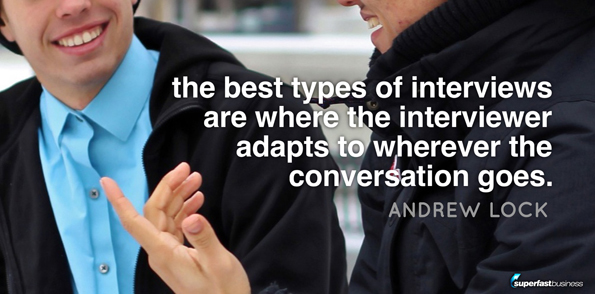 Andrew: Well, it’s not my cup of tea because I think that the best types of interviews are where the interviewer adapts to wherever the conversation goes. You know, that’s the way to get the best information, I think, rather than sticking rigidly to a script. So I made it my own. And that’s when I really saw a big jump in the viewership, naturally, because when people were guests on the show they would invariably mention it to their tribe. So that’s probably the biggest thing that I overlooked for quite a while.
Andrew: Well, it’s not my cup of tea because I think that the best types of interviews are where the interviewer adapts to wherever the conversation goes. You know, that’s the way to get the best information, I think, rather than sticking rigidly to a script. So I made it my own. And that’s when I really saw a big jump in the viewership, naturally, because when people were guests on the show they would invariably mention it to their tribe. So that’s probably the biggest thing that I overlooked for quite a while.
James: That’s a great tip and I appreciate you sharing that. I’ve certainly found having guests can make it a little more interesting for my audience. And I love doing the solo ones as well, but the co-hosted ones that I do are fun.
Andrew: Yeah.
James: You know, I encourage everyone to check out your show because you do have some funny things. I especially like What Were They Thinking? That one always brings the house down. So you could be found at HelpMyBusiness.com.
Andrew: That’s it.
James: That’s where you can check out that main show. And you’ve got other resources for starting a show at StartAWebShow.com. Andrew Lock, thanks for coming back again and sharing this information with us.
Andrew: It’s always a pleasure, James, always fun to chat with you.
Get your own show – Andrew has a course
Recharge yourself (and your business) with a week in the tropics! – Click HERE
Enjoyed the show? Subscribe to us on iTunes
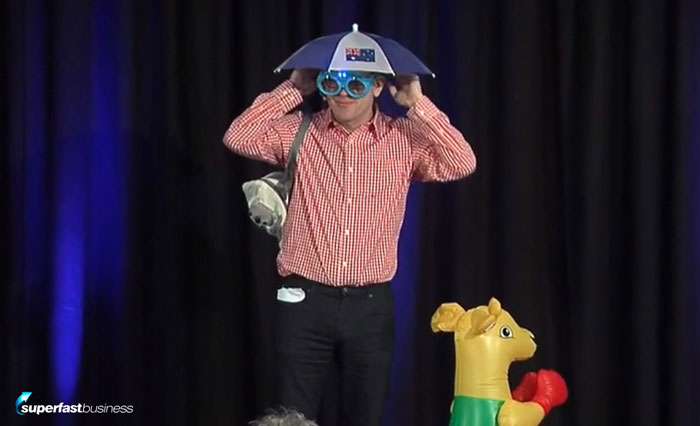



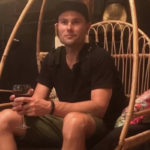





Leave a Reply